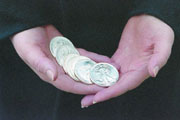A FIVE-YEAR LEGAL BATTLE over a rare coins pyramid scheme went out with a costly bang this week. Downtown Seattle tax attorneys LeSourd & Patten agreed to pay $3 million to settle extraordinary claims of malpractice brought against the law firm. More than 300 investors accused the firm of enabling coin dealer Craig Rhyne to swindle them out of as much as $5 million. But investors such as Andrea Spignesi of Ballard, who functioned as the unofficial epicenter of investor/victim information since 1996, says many of Rhyne’s victims are dismayed at getting back under 40 cents on the dollar and having to pay $1 million in attorney fees.
Meanwhile, Rhyne, 51, the rakish, one-legged former king of downtown precious metals and coin dealers who has completed a 33-month term at a federal prison camp for fraud, is obligated by the court to pay back his 334 victims just $500 a month.
“At that rate,” says a displeased Spignesi, who undertook her own investigation into the case, “victims will be paid in full, minus interest, in about 833 years.”
Spignesi lost $15,000 when she paid Rhyne for 2,000 US Silver Eagle coins that were never delivered (her mother, 81, lost $3,500). Some investors were defrauded of their life savings. Among the greater victims, 76-year-old retired Yakima doctor Ralph Uber lost most of $269,000 in coins and annuities.
Though a federal court in 1997 found Rhyne stole $3.6 million in customer assets, Spignesi says the true value was $5 million.
“At Rhyne’s sentencing,” she says, “he showed up on crutches, minus his $60,000 artificial leg, and in the company of a public defender. We were to believe that he was not only broke but just an average guy who happened to manage his accounts badly.”
The court found Rhyne willfully duped investors for a decade. Launching his business in 1976 with a $19,000 insurance settlement for the loss of his leg in an auto accident, Rhyne sometimes earned $1 million annually until running into a minefield of market miscalculations and bad investments.
By 1990, he was taking payments for coins and metals that he never delivered, claiming he was storing them at his Pike Street office. In fact, he was using the funds to hold off other investors and creditors.
When that pyramid scheme crashed in 1996, Rhyne gave himself up to federal authorities. The coin dealership went into receivership, overseen by Seattle attorney Scott Henrie, who recalls finding Rhyne’s offices in such disarray that wedding rings lacked ownership tags and gold coins were found beneath typewriters. After Henrie concluded that LeSourd & Patten may have abetted Rhyne, he hired attorney Christopher Pence to seek compensation for investors from the law firm (with a contingency fee of one third of any settlement).
RHYNE SIGNED ON in the 1980s with LeSourd & Patten, which bills itself as Seattle’s oldest (1955) tax-litigation firm. The firm is headed by ex-federal tax lawyers whose specialties include, according to advertisements, cases involving tax evasion, money laundering, and offshore tax havens.
Court testimony and documents reveal that L&P continued to counsel Rhyne even after it became aware in 1990 he was $1.3 million in debt. Rhyne, says attorney Pence, was entitled to have the law firm’s advice, but “he was not entitled to have the assistance of a lawyer” in his criminal scheme. Attorney Henrie says LeSourd & Patten’s records show the firm euphemistically referred to the Ponzi scheme as “unshipped orders,” which in court settlement papers are defined as “precious metals that customers had paid Rhyne to purchase and store, but which Rhyne could not account for.”
According to Pence, L&P’s attorneys knew Rhyne was committing fraud but mainly worried whether the Internal Revenue Service would learn of it. Pence says L&P helped Rhyne gain a $250,000 out-of-court settlement (in a lawsuit brought by an investor) that essentially provided Rhyne with “additional time to continue to defraud new customers out of hundreds of thousands of dollars” to pay off that settlement. “Craig Rhyne rose to the occasion,” settlement papers claim.
There’s no indication criminal charges against L&P are being considered. Attorney Pence told investors that “we cannot prove that what [L&P] did wrong caused your losses.” Rhyne, he said in court, is “the number one villain.” L&P attorney Robert M. McCallum said the firm could not comment on the settlement or the claims due to a confidentiality agreement.
While one investor shrugged and said after court, “Well, at least it’s finally over,” Spignesi was more reluctant to accept the judge’s settlement ruling. LeSourd & Patten should have been taken to trial and forced to pay more of the losses, says Spignesi (L&P’s insurance company will foot the $3 million tab). She wasn’t pleased that Pence’s work for her and the other victims will bring him $1 million, a third of the settlement. She also suspects Rhyne has funds secreted away in offshore accounts.
Two years ago, Rhyne told Seattle Weekly in a letter that he was broke, claiming the money went for “overhead, employees, and other related expenses,” such as legal advice.
“I’ll only get a few thousand back, I guess,” said Spignesi. “Maybe I’ll use it for a trip out of the country.”
To check out hidden offshore accounts, by any chance?—she was asked. She merely smiled.








